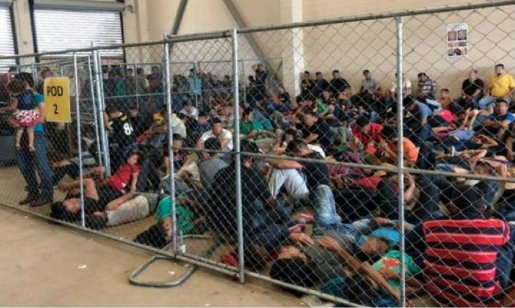As Americans look for ways to help hundreds of migrant children held in unsafe and unsanitary conditions at border detention facilities, a change in law may be required for U.S. government agencies to be able to legally accept private donations.
A few weeks ago, a team of lawyers, doctors, and interpreters traveled to a Border Patrol facility in Clint, Texas to document government compliance with the Flores settlement, an agreement which mandates that migrant children are held in safe and sanitary conditions, and that they are released from immigration detention centers without unnecessary delays.
After sitting down and interviewing more than 50 children, some of whom had been there for weeks, the conditions the lawyers documented were unsettling: Kids taking care of kids, rare bathing opportunities, rampant lice and flu outbreaks, and many sleeping on the floor.
These are harrowing first-hand accounts from children in custody based on interviews from attorneys in the camps. Every American should read them and demand we close the camps immediately. The truth is right here: It's up to us to listen. #CloseTheCamps pic.twitter.com/DSxJyUNGjp
— Families Belong Together (@fams2gether) June 27, 2019
Over the past few weeks, U.S. Border Patrol has reported holding more than 2,000 children in custody on any given day, despite the fact that legally, a child is not supposed to endure more than 72 hours in a detention facility before being transferred to the Department of Health and Human Services for relocation.
Following the circulation of these harrowing reports, various Texans tried to get involved. Gabriel Acuña traveled to the Clint facility, toothpaste, toothbrushes, soap and baby shampoo in hand, prepared to donate to the nearly 300 migrant children residing inside.
Hours later, a group of six more people arrived at the facility with $340 worth of supplies. However, upon their arrival, Border Patrol agents refused to acknowledge them and they were met by locked lobby doors.
Ultimately, both attempted donations were rejected, drawing a myriad of criticism from members of Congress, their constituents, and organizations working in the immigration space.
“Children and adults have the right to be treated humanely and, during the time that the government is depriving them of their liberty, the government is responsible for providing appropriate care,” Sara Ramey, executive director of the Migrant Center for Human Rights, told The Globe Post. “Donations should not be necessary but it would be good if people were allowed to make gifts.”
Despite the abhorrent conditions uncovered by the attorneys, according to experts, there is a legal rationale as to why government agencies, including Border Patrol, won’t accept the supplies from eager donors.
In accordance with the Antideficiency Act, federal agencies are prohibited from spending any money or accepting any donations from outside parties, aside from what they have been allocated by Congress.
“It’s partially a constitutional thing about Congress controlling the purse and only being able to spend money that Congress gives, but it’s also about ethics,” Theresa Brown, the director of immigration and cross-border policy at the Bipartisan Policy Center, told The Texas Tribune. “Without a change in law, DHS, CPB and Border Patrol cannot accept those private donations.”
IMPORTANT: Without specific legislative authority, DHS generally cannot accept private donations. 6USC453(b). But FEMA can do this in an emergency. That's why we need FEMA-like authorities for migration events. https://t.co/stb7F0P7ua https://t.co/AKcvGfyHqd
— Theresa Cardinal Brown (@BPC_TBrown) June 25, 2019
In response to the outpouring of criticisms, Customs and Border Protection (CBP) is currently working towards being able to facilitate donations in the future.
“CBP must comply with Federal law and relevant DHS policy in order to receive and manage donations,” a CBP spokesperson told The Globe Post. “At this time we are coordinating among relevant CBP offices, including our Office of Chief Counsel to determine how we can most efficiently accept and manage donations from the public, in compliance with law and policy.”
However, in the meantime, many Americans are itching to help.
Although CBP itself cannot currently accept donations, the spokesperson added that individuals could consider refocusing their efforts toward other non-governmental organizations working along the Southwest Border that are “also overwhelmed with the large number of families they are helping and may be in need of donations.”
While individuals might think they know what supplies children in detention facilities or relocation centers need, Olga Byrne, director of immigration at the International Rescue Committee (IRC), said consulting and purchasing items off of premade lists can ensure that a donation is fulfilling a legitimate need.
“We have donation pages, we have Amazon Wish Lists, and most of our partners have these as well,” Byrne told The Globe Post. “So the people who are on the front lines who are working with families every day and know best if they need more diapers, if they need more backpacks for the bus journeys to final destinations, or more Pedialyte, or whatever those needs may be, they’ll have that usually pretty well documented and charted out.”
Furthermore, by making direct financial donations or volunteering time to organizations that already have an established presence along the U.S.-Mexico border, those organizations can sufficiently respond to sudden changes on the ground, as well as in the political sphere.
“That financial contribution goes toward the whole of our response,” Byrne said. “It could be toward buying supplies for Phoenix, it could be toward hiring additional staff members who are the backbone of that operation, it could be for making improvements to the physical spaces that we are using to provide shelter to people. It gives us the flexibility to be able to respond in increasingly rapidly changing policy environments.”
In the midst of the immigration crisis, a myriad of GoFundMe appeals and other crowdsourcing campaigns have also sprung up online. While many of these are legitimate and are verified to ensure that the funds raised actually make it to the intended recipients, individuals should also do their research before contributing to that particular cause.
“I would just suggest if there’s a small organization, to see who they’re affiliating with. Who are their partners? Are those partners also listing them on their websites?” Byrne said. “But from our perspective, the collaborative nature of the work has really been key to our success, so that might be one factor that people who want to support this work might look to.”
Photo Intensifies Calls for a Humanitarian Response Along US-Mexico Border






















